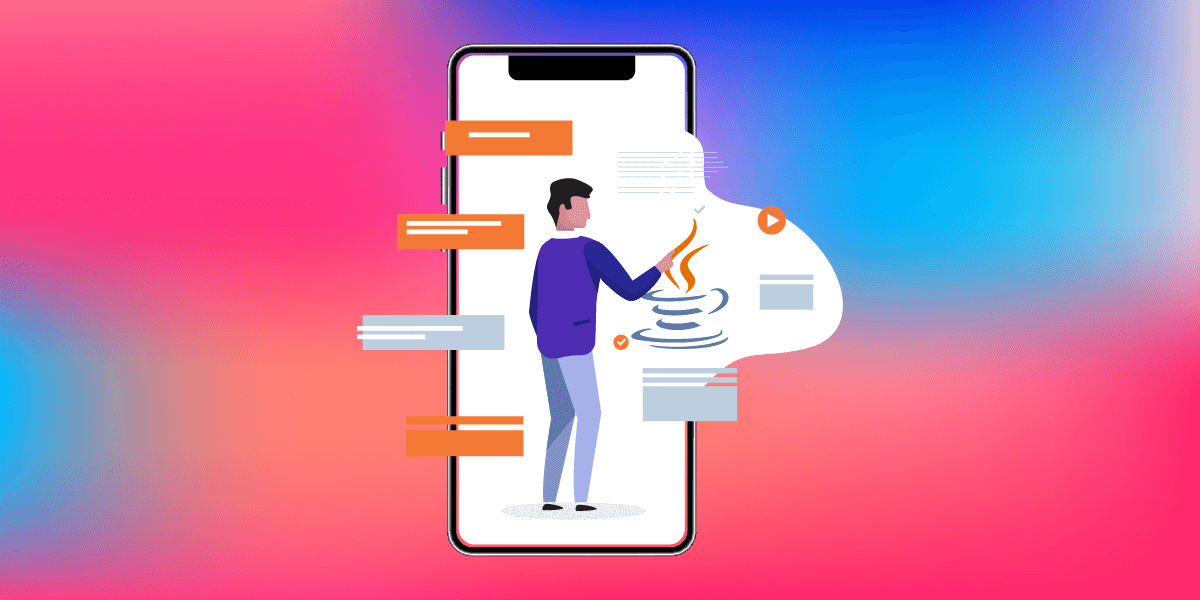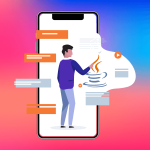If you’re in any area close to digital development, you’ve probably heard the following: the choice of Java for iPhones and their native applications is impossible. Native apps/applications for Android, as well as its counterpart iOS are coded by means of very specific native languages designed and developed solely for these platforms: iPhone software is coded either in Swift or Objective-C, while an Android one is created by means of either Kotlin or Java. Naturally, there also exists a cross-platform framework. It helps to create software that works (with some mild changes) equally well both on Android and iOS. Nevertheless, things progress and there’s been a major shift in the choice of a language when it comes to Java mobila.
It all was launched with the differentiation between two core software stacks: iOS vs. Android. Creating any mobile software for iPhones was centered around Objective-C, which is the language that came to us in the 1980s. With time, Swift appeared to be a default choice. The same happened to the Android stack: Java was the original instrument that was later complemented by Kotlin. Researchers from AssignCode have studied this question to the core and know exactly why Java has grown into a programming language for both platforms. Let’s learn the ins and outs of Java for mobile in general and Java on iOS in particular.
The Evolution of Java on iOS Devices
As one of the first progressive coding languages, Java is still utilized by numerous web apps for building interactive interfaces. In order to access the website’s elements, it’s a must to have this language installed on a device. But Safari and iOS don’t support it. For a regular developer, this is an immense issue. As well as it is for those users, who need to access any Java web app from their iPhones. To date, they need to use Cloud Browse to view Java web apps.
It all started with Steve Jobs, who once declared Java wasn’t worth to be used on iPhones because of its heavyweight chains. Here’s what we know for a fact: Post his words Apple Blocked the use of Java Virtual Machine (JVM) on iPhones. However, Java can now be effectively utilized as a part of the iOS stack or the Android stack because app programmers learned how they can design and code in Java to develop iOS applications.
Navigating iOS Development with Java
It is really simple to explain why Java for iOS is a thoroughly navigated subject matter amongst researchers and programmers as well as why people keep asking questions related to the choice of Java on iPhone:
- there remain lots of old applications built on Java stack that could be transformed to become iOS software;
- those, who aren’t eager to learn to write in Swift, stay with Java but still can be called cross-platform developers;
- coding in Java for both platforms is twice as cheap as writing two separate applications from scratch.
OpenJDK Mobile and GraalVM: Java’s Gateway to iOS
So the circumstance that Apple decided to obstruct the application of a Java Virtual Machine (JVM) on their devices intended to prevent Java coders from designing a platform based on Java for iPhones or iPads. Nevertheless, it appeared that developers had other options to go with.
Using an established iOS software development kit – OpenJDK Mobile, Java programmers can design and develop software that will be used on iPhones. Programmers exploit OpenJDK and GraalVM to connect native iPhone libraries to the code in Java.
Overcoming the Java Virtual Machine Barrier
For Java programmers to create for both platforms, the GraalVM was introduced. This is an ahead-of-time compiler to be applied for the process of converting the source code into object code in the iOS platform. With its help, programmers will quickly connect the already converted code in Java with the native libraries of the iOS platform’s original language, thus making the software executable for the iOS platform.
Cross-Platform Development: Java on iOS and Android
Programmers, who utilize Java for iOS app development, are capable of building cross-platform applications as well. This means that by means of a single app owner and their business will be able to engage with devices and users both on iOS and Android.
The Strategic Advantage of Java for Cross-Platform Apps
An actual true advantage of Java for iPhones in this case is a well-developed unrestricted community where, in case of any issues or bugs, there’s always a possibility to find answers. Plus, all cross-platform products on Java for iOS are lighter and perform better.
Security Considerations in Java for iOS Apps
Another motive for choosing Java language to help programmers design iPhone software is its exceptional security features. When this language was first created, the question of its safety was chosen as the code cornerstone. In a time when cyber attacks have become more frequent, Java mobile design is able to handle any attacks thanks to the language’s robust features and tools.
Ensuring Robust Security with Java on iOS
There’s one thing that makes Java a highly secure choice for iOS app development: It’s whether Java app runs on a client machine or server, it’s robust a secure since these features are guaranteed by the source code compile-time checks, namespace isolation, a within-restricted-sandbox execution, and pointer arithmetic removal.
Java to iOS: A Developer’s Transition Guide
A transition handbook basically means it is necessary to check current App Store guidelines, to make sure that there is a one-to-one API equivalent (much depends on how an Android app is integrated with any external APIs), and to consider the need to slightly transform the design of Android phone to that native for iOS.
FAQ:
Is it possible to develop iOS apps using Java?
Yes, Java is one of the general-purpose coding languages meaning that its libraries and tools are utilized to design and build applications for both mobile platforms. To make it possible, programmers need to Overcome the Java Virtual Machine Barrier by means of GraalVM.
What are the benefits of using Java for iOS app development?
For quite a while now, Java has been a dominant coding language with legacy big-data instruments, versatility, flexibility, and a high level of security. Unlike most other languages it works for cross-platform development and can help business owners save their development time and money either by bringing their old Android apps to a new platform (iOS) or by building one application from scratch that will work effectively on both platforms.
How does OpenJDK Mobile facilitate Java development for iOS?
OpenJDK is the enforcement of the Java platform that can be used for free. Programmers in the modern world tend to use OpenJDK and the GraalVM compiler. In the process, the experts in the area of programming connect the code. The latter is already compiled and written in the Java programming language with native libraries.







